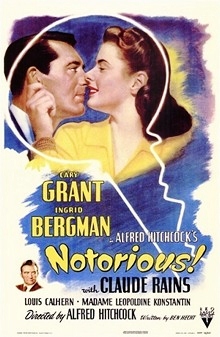
So we’ve watched quite a few of Hitchcock’s films now over the past couple of years. This one is not one that I would have chosen to watch on my own as I don’t believe it is particularly notable. My cinephile friend however suggested this as a film that somewhat different from the usual Hitchcock formula. In fact while it does star Cary Grant and Ingrid Bergman, who make for a very standard Hitchcock couple, it’s not much of a thriller at all.
It’s 1946 and the father of the character Bergman plays, Alicia Huberman, has just been convicted of being a spy for the Nazis. Grant plays a government agent, T. R. Devlin, whose job was to put Alicia under surveillance. He approaches her with an offer to work for the U.S. government by infiltrating the Nazi organization her father was a member of and who have since established themselves in Brazil. She eventually agrees and learns that her target is Alexander Sebastian, one of her father’s friends and someone who had once loved her. At the same as Alicia and Devlin spend time working with each other, they naturally fall in love. Their relationship is tested when Alicia has to pretend to have a romance with Sebastian in order to infiltrate his social circle, going so far as to marry him.
This has all the makings of a serviceable spy caper and indeed a key scene has Devlin sneak in at a guest to a dinner party that Alicia hosts in order in find out what Sebastian is hiding in the house. Unusually for Hitchcock however, the usual sense of tension and danger here is understated and instead the romantic feelings between the two leads dominate the film. Alicia openly displays her affections for Devlin early on and invites him to do the same, gently mocking him at the same time for his reluctance to admit that he has fallen in love with a woman who is compromised and morally doubtful. This ‘will they or won’t they’ tension drives the whole film with Alicia’s ever closer relationship with Sebastian as the primary obstacle. I find it very interesting that it is effectively Alicia who pursues Devlin and not the other way around, which can be seen in how assertive Bergman plays her character and how passive Grant is.
Personally I can’t say that this appeals much to me. I find this sort of tension to be incredibly contrived and therefore unbelievable since obviously he loves her and so dancing around the subject is just stupid. On the other hand, this may be a male-female divide thing. My wife loved this and Patricia Hitchcock apparently thought this was one of her father’s best films. I think this film suffers horribly from the moral codes of the era. The story clearly implies that Alicia is promiscuous even if the plot doesn’t really call for this but is unable to come out and say so and has to settle for saying that she’s a bit of an alcoholic. The film even underplays the physical aspects of the marriage between Alicia and Sebastian when sexual tension is exactly what is needed to ramp up the drama. In other words, this film badly needed to be more European and less American.
There were plenty of things that I liked, mostly the elements that are more traditionally Hitchcockian such as the whole sequence after Sebastian discovers that Alicia and needs to get rid of her without raising a ruckus. Sebastian, as played by Claude Rains, was a much more interesting character to me than Grant’s Devlin. Plus of course the quality of the master director’s craftsmanship throughout is undeniable. Overall though I found this to be a decent but ultimately missable film.